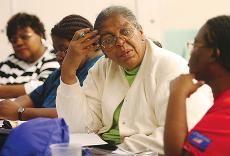Adult education program finds receptive home

Bernadine Lampkins of Champaign asks a question in her philosophy class at the Douglass Branch of the Champaign Public Library on Tuesday night. The class is part of the Odyssey Project, a college-level course offered for free to residents of Champaign-U Josh Birnbaum The Daily Illini
Sep 13, 2006
At one end of the room, a young girl sits with a philosophy packet in hand. To the right, her red dictionary is topped with her cell phone and accompanied by a Taco Bell drink.
Across from her, a 56-year-old woman in her ivory-buttoned sweater is up against her desk in a wheel chair, squinting to read “Seven Threats to Ethics.”
Tuesday night was the first philosophy course the participants, 28 women, had together through the Odyssey Project, held by the Illinois Project for Research in the Humanities.
In its first year in Champaign-Urbana, the Odyssey Project provides two semesters of instruction in the humanities.
The program is free of all costs to qualified residents who are under or slightly above the poverty level.
Get The Daily Illini in your inbox!
“(The project) rests on the belief that reading (humanities) has inherent value,” said John Marsh, the project coordinator. “One gets to know the world better and…what it means to be human.”
This afternoon, the Odyssey Project will officially be underway.
At 4 p.m., Danielle Allen, Dean of the Humanities Division at the University of Chicago, will give a lecture at the Spurlock Museum Auditorium, 600 S. Gregory St., which will be followed by a reception for the Project.
Allen was essential in founding an Odyssey Project in Chicago.
There is another Project in Springfield, making C-U’s Project the third in Illinois.
Another sponsor includes the chancellor Richard Herman.
He financially supported the home departments of the University faculty members who are teaching in the Odyssey Project when they would otherwise be instructing University courses.
“The University has and understands its responsibility to the community that houses it,” said Marsh, the project’s writing and critical thinking teacher.
The classes for these participants are held Tuesday and Thursday nights from 6 to 8 p.m. at the Douglass Branch Library’s meeting room.
They alternate between two teachers and their disciplines each semester, which include literature, art history, philosophy, U.S. history, and writing and critical thinking.
At first, Marsh said, it was difficult to find people to sign up.
“I was going to consider it a success if we had 15 to 20 people,” he said. “Thirty is really wonderful.”
With an impressive turnout for its first year, the project has provided an opportunity for many people to continue their educational career after high school.
“For better or for worse, college education is one of the few opportunities people have to significantly improve their economic lives,” Marsh said. “We ought to make that opportunity as widely available as possible.”
Upon completion, the course awards six hours of general humanities credit from Bard College in New York.
Bernadine Lampkins, a 56-year-old Champaign resident and student in the project, recently had a stroke.
She is taking the opportunity to see if she can go back to school for her masters degree.
After reading a few philosophy pieces, she said she had a headache.
“It made my brain cells regenerate,” she joked.
Along with providing an opportunity for low-income residents to become better educated, the course has great diversity in age.
“The life experiences are going to be vastly varied in a really interesting way,” said Debra Hawhee, associate professor of English and Speech Communication and philosophy teacher for the project.
A 24-year-old Urbana resident, Jama Thomas, is trying to complete her degree in law school after being a stay-home mother for her three children.
“I have confidence in it and it can go a long way,” Thomas said of the project.
Teaching this course will be different for Hawhee than teaching a University class. She said she’d have to draw from all their experiences, given the drastic age differences.
“I can’t just have pop culture analogies,” she said.
Despite the differences in the participants’ backgrounds, the class has a sense of unity. They are all very thrilled to be in this course.
“There was a great deal of excitement, even exuberance, in the class as we all got used to the idea of sharing reactions and creating ways to respond to each other,” said Dale Bauer, who had her first English class Thursday.
Hawhee agreed that “eagerness and initiative to even sign up for Odyssey” shows dedication.
As for the Project in general, this is only the beginning. Plans will soon be made to incorporate more diverse subjects into the course.
In the spring, they will invite various local colleges such as Parkland Community College to give presentations to the class.
“There is a hope that there will be a more formal connection (with these colleges) in the future,” Marsh said.
Marsh said students and teachers have already signed up for next year’s courses.
“I have the highest hopes for what (this project) will do for the individual people,” Marsh said. “The course also makes people more aware of their community and their history and (helps them) participate more in shaping those.”





